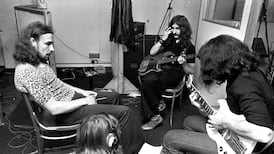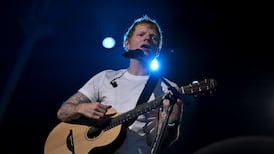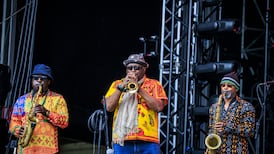Black feathers and 17ft of black silk - and that's just the costume. Rufus Wainwright tells LAUREN MURPHYabout his operatic tendencies, how he's coping with the recent death of his mother and his plans for some toe-tapping pop
VOLCANIC ASH? If it was a storyline in a tacky soap opera, you’d scoff disbelievingly and change channels – but a plume of the stuff was causing a creeping tide of airport closures that quickly spread across the western Europe.
In a way, it seemed like a fitting way to have an in-person meeting with Rufus Wainwright – a musician who positively thrives on drama – cancelled.
When I eventually speak to him later that day on the telephone, he's audibly tired, but safely ensconced in Glasgow having travelled from London (where his opera Prima Donnais currently raking in rave reviews). His European tour starts in the Scottish city tonight, and if it hadn't been for British Rail preventing the gig from being abandoned, he'd be forgiven for thinking that 2010 has not got off to the best start.
True, new album All Days Are Nights: Songs for Luluhas been positively received, but he also lost his mother, lauded folk singer Kate McGarrigle, in January – the consequences of which, he admits, he hasn't fully had time to process. The pair enjoyed a particularly close bond, a fact that has been highlighted in recent interviews.
“I have had the opportunity to relive a lot of the experience – for better or for worse – through the press, and have therefore shed a lot of tears, and continue to,” he says frankly. “So perhaps that’s been helpful in getting me to the next level. But then again, also, y’know, traumatising myself daily is not always that great, either. My position is that I’m taking all of July off, when I’m going to do nothing. That’ll be a real test, to gauge how I’m doing. Right now I can’t. I’ve too many questions.”
Although his sixth album was recorded before McGarrigle passed away, much of its subject matter touches on her illness. Is recreating those songs night in, night out going to be a trial?
“Well, as far as my songs are concerned, I’m frankly more worried about getting through them technically, because they’re very demanding,” he explains. “I’m focusing on that aspect right now. You know, I always try and put as much emotion as I can into everything, but I have a feeling that it may be tougher than I expect. Perhaps by the time I reach Dublin, I’ll be primed. But that being said, I often sing one of my mother’s songs in the show, and I usually leave it to the end. And once I get there, it’s an emotional ocean storm. A lot of the pent-up feelings that I might have had are just let loose with her music.”
He’s not kidding about the technical complexities of his new material; the album, featuring mainly just voice and piano, is his starkest work in years. Many of the songs are more musically intricate than anything he’s done before, and its stripped-back nature has surprised many, who expected his first album after his opera to be a grandiose affair.
“For years, I’ve been slightly insecure about my piano playing, actually,” he says. “I studied classically for a long time, but was never really very good at the hard stuff. But I could write these songs, and I felt that it was necessary at a certain point to just face that beast, and really create a group of pieces that show off my instrumental ability. So that was the practical side.
“But the other thing was that I was very much drawn to the piano throughout these various gargantuan moments in my life, whether it was death, or opera, or Berlin . The piano became the only place I could be alone, and really sort of process what was going on around me. So I felt protected by the instrument, in a lot of ways.”
Wainwright has always been a gregarious stage performer – not least when he toured his last studio album, Release the Stars, and included a choreographed homage to Judy Garland in top hat and high heels in the show. The new material, however, calls for an altogether more subdued approach.
“The show is in two parts, the first being the new album. I perform that as a song cycle, meaning that I request no applause during the whole first half of the show. And I actually come out making a very dramatic entrance with this incredible outfit that my friend Zaldy made for me – he did Michael Jackson’s costumes too. It’s got black feathers and 17ft of black silk, and there’ll be this incredible film by Douglas Gordon, a Scottish artist, projected behind me. I kind of perform my album as really more of an art piece than a pop record.
“So I do that, and then give everybody a chance to knock back a few,” he chuckles, “and then come back, and the lights are brighter, I’m in my day clothes, and we just have a fun time for the rest of the evening. So it’s a pretty wide-ranging show.”
The austere nature of the album means that Wainwright's voice is also brought to the fore on All Days Are Nights. His distinctive quivering drone polarises opinions, and it sounds as clear and robust as ever on these songs – particularly on standout tracks Marthaand Zebulon.
“Well, I’m hoping that I’ve inherited that from my parents,” he says. “My mother was always a very good singer, but my father has become, kind of steadily, a better singer all his life. And now, at the age of 63, is perhaps singing better than he ever has before. And I’m hoping that I have that genetic quality. So I’m just trying to imitate my dad.”
He laughs when I suggest that that's a sentence he probably never would have considered uttering at one point of his life. His relationship with Wainwright Snr has been notoriously fraught in the past, but recent reports suggest that age – and possibly losing McGarrigle – has mellowed the tension. Indeed, the line "There's not much time for us to really be that angry at each other" on the ultra-personal Marthais perhaps more revealing than anything else. Was the desire for that confessional, personal tone the reason he chose to produce himself for the first time in his career?
“Well, for one thing, this album was just very simple – I didn’t need to hire a special producer for a solo record. And then I got Pierre Marchand on board, who I worked with before, and whose mixing I adore, so he kind of gave me some production tips and helped me out with a few of the songs, too. Mainly, it was just because I could do it – but also financially, it’s much easier when I don’t have to pay myself,” he laughs.
He’s done the opera, the tribute albums, the live albums, the opulent, orchestral arrangements, and is held in high regard by most musicians worth their salt. What ambitions are there left for the Montreal native to achieve? It may be too early to say, but does this basic set-up herald a new era of exposed, unembellished writing in the Rufus Wainwright songbook? Not a bit of it.
“I’d like to do a pop album now, frankly,” he says. “Especially after my foray into the opera world, where you’re really chained to a formal tradition that’s pretty much impossible to manoeuvre quickly. Pop is really about the moment, so I’m excited to make a pop record, and for it to be about having fun. I mean, I’ll always have a somewhat dark, and sad, and sentimental perspective – but I would like the next one to be a little bit more, hmmm . . . toe-tappy.”
He may well enlist friend, fan, former collaborator and full-time Pet Shop Boy Neil Tennant in that project, too. Tennant isn’t the only celebrity admirer of Wainwright’s, though: he’s been called “the best songwriter on the planet” by Elton John; he regularly rubs shoulders with the likes of Jonathan Ross and Jamie Oliver when in the UK, and a recent invite-only show in New York saw the likes of Zachary Quinto and Drew Barrymore in the crowd. With parents like his, fame has always been a fixture of Wainwright’s life – but is he ever concerned that such hobnobbing will detract from his credibility as a serious artist?
“Well, I don’t know,” he says in that thoughtful drawl. “What I’ve learned in this operatic endeavour . . . Talk about going for credibility, you’re going right to the Rosetta Stone of art, in a way. These people don’t break for you unless you’re dead for over 100 years. But what I’ve learned is that I work so hard, and dedicate so much of my time, and effort and emotion into all of these projects – and at the end, it’s really just labour-intensive. That’s what kind of counts. You can talk about it, and philosophise, and worry, and plan things – but until you actually go out there and do your job, none of that really matters. So I’m just really doing the job, and that sort of dictates what happens next.”
Whatever happens next, he agrees that his life has changed drastically over the past decade. In 2000, the now 36-year-old had yet to record the career-breaking Want Onealbum, was still seen as something of a cult performer, and was living a somewhat hedonistic lifestyle in New York City. Does the Rufus of yore – the one who then struggled with a crystal-meth addiction – feel like another person these days? Do the old songs still have meaning?
“I mean, Want One, I can still relate to,” he says, after a pause. “For me, it’s more like the first album or the second album that seem somewhat distant at this time. But yeah, I definitely don’t have that blissful ignorance about the boundaries of human existence. I went to the edge, and saw the abyss, and now I know where not to go. And there was a time that I didn’t have that knowledge, y’know?
“Sometimes I miss it, but also, I think I’m a lot happier now. I think once you know your limits, you can actually start thinking about happiness.”
-Rufus Wainwright plays the Grand Canal Theatre, Dublin, next Wednesday. All Days Are Nights: Songs for Luluis out now










